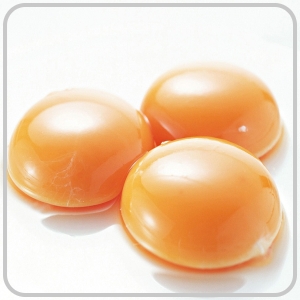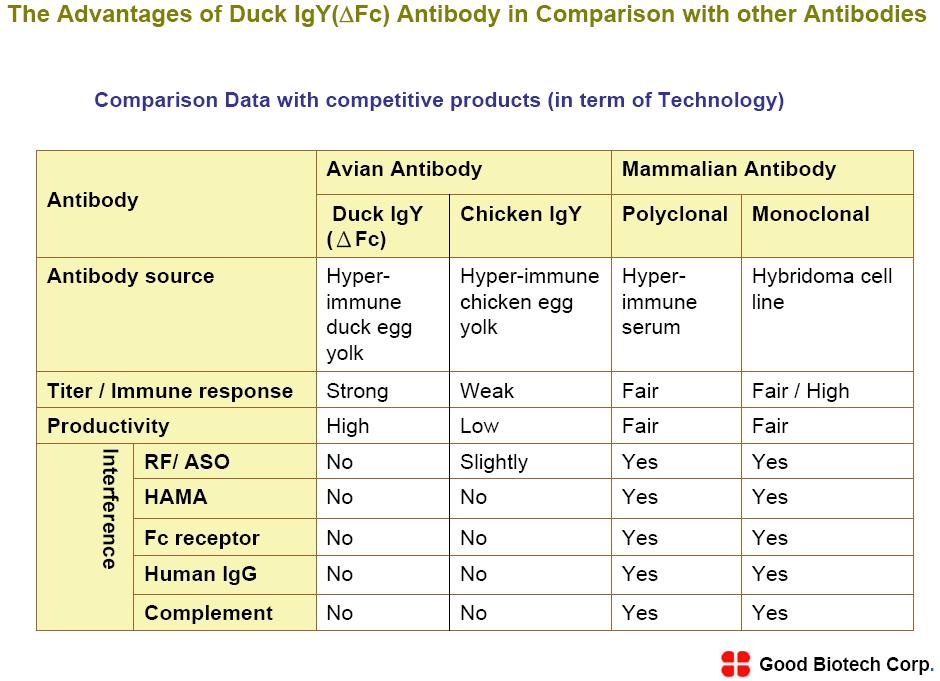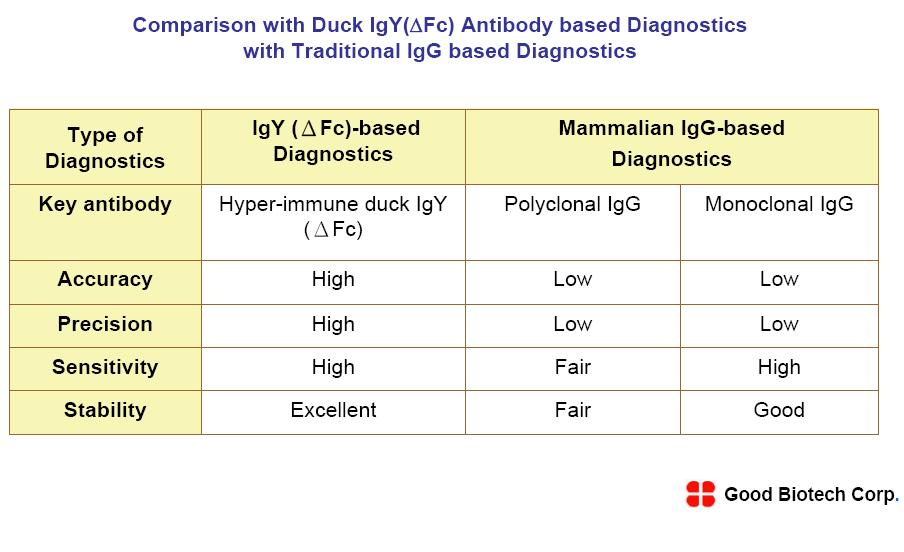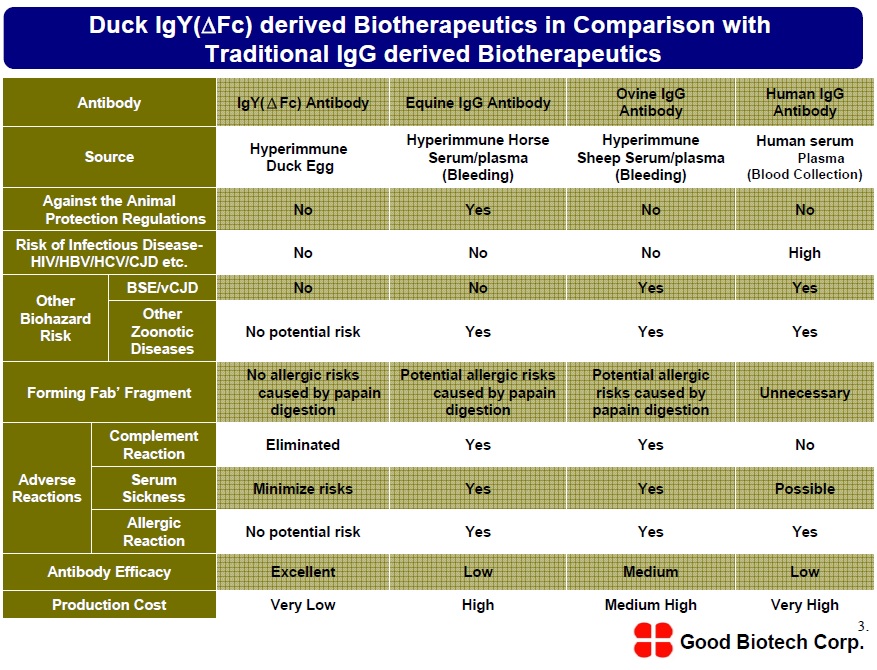Eliminate the interference problem
 The major advantage that duck IgY(ΔFc) antibody offers is that it can effectively eliminate the interference problem, which often occurs in immunochemical assays utilizing mammalian IgG. Duck IgY (ΔFc) antibody is capable of binding to the specific antigen efficiently but yet it does not have any cross-reaction to other interferents. Even in the presence of a large number of interferents e.g., rheumatoid factor, complement, Fc receptor, bacterial Protein G and/or A in mammalian sera, the use of duck IgY(ΔFc) antibody in immunological assays can greatly reduce the possibility of the false positive/negative reaction.
The major advantage that duck IgY(ΔFc) antibody offers is that it can effectively eliminate the interference problem, which often occurs in immunochemical assays utilizing mammalian IgG. Duck IgY (ΔFc) antibody is capable of binding to the specific antigen efficiently but yet it does not have any cross-reaction to other interferents. Even in the presence of a large number of interferents e.g., rheumatoid factor, complement, Fc receptor, bacterial Protein G and/or A in mammalian sera, the use of duck IgY(ΔFc) antibody in immunological assays can greatly reduce the possibility of the false positive/negative reaction.Increase detection accuracy
 In enzyme immunoassays, our investigations have shown that duck IgY (ΔFc) antibody does not react with the complement system, rheumatoid factor, and Protein A. Thus, it can increase detection accuracy in immunological systems
In enzyme immunoassays, our investigations have shown that duck IgY (ΔFc) antibody does not react with the complement system, rheumatoid factor, and Protein A. Thus, it can increase detection accuracy in immunological systemsNo cross-reactivity was observed with mammalian IgG
.jpg) Duck IgY(ΔFc) antibody exhibits NO cross-reactivity to mammalian IgG because of its structural differences with mammalian IgG antibody, thus eliminating the unwanted reaction in immunological assays utilizing the anti-species antibody.
Duck IgY(ΔFc) antibody exhibits NO cross-reactivity to mammalian IgG because of its structural differences with mammalian IgG antibody, thus eliminating the unwanted reaction in immunological assays utilizing the anti-species antibody. Avoid the interference of HAMA in “sandwich-type” immunoassays
.jpg) Mouse monoclonal antibody has been widely used for in vivo diagnosis and therapy. In these cases, patients receiving monoclonal antibody is often induced an immune response by producing a nonspecific heterophilic antibody—human anti-mouse antibody (HAMA). HAMA, reacting not only with mouse antibodies but also with structurally closely related antibodies such as other mammalian IgGs, presents a big problem in immunodiagnostics, especially in “sandwich-type” immunoassays such as ELISA. Since duck IgY(ΔFc) antibody has no immunological cross-reactivity to mammalian IgG, the interference of HAMA in “sandwich-type” immunoassays can be avoided by replacing one or both of the capture and detecting antibodies with duck IgY(ΔFc) antibody.
Mouse monoclonal antibody has been widely used for in vivo diagnosis and therapy. In these cases, patients receiving monoclonal antibody is often induced an immune response by producing a nonspecific heterophilic antibody—human anti-mouse antibody (HAMA). HAMA, reacting not only with mouse antibodies but also with structurally closely related antibodies such as other mammalian IgGs, presents a big problem in immunodiagnostics, especially in “sandwich-type” immunoassays such as ELISA. Since duck IgY(ΔFc) antibody has no immunological cross-reactivity to mammalian IgG, the interference of HAMA in “sandwich-type” immunoassays can be avoided by replacing one or both of the capture and detecting antibodies with duck IgY(ΔFc) antibody. It is more humane to obtain antibodies from the egg yolk of ducks than from the serum of sacrificed mammals. Duck IgY(ΔFc) antibody production is also compatible with modern animal protection regulations.
It is more humane to obtain antibodies from the egg yolk of ducks than from the serum of sacrificed mammals. Duck IgY(ΔFc) antibody production is also compatible with modern animal protection regulations. On the whole, duck IgY(ΔFc) antibody wins an advantage over mammalian IgG in many aspects. It is particularly suitable for use in immunological assays involving mammalian sera. Duck IgY(ΔFc) antibody is also uniquely suitable for use in oral-administration applications. Highly purified Duck IgY(ΔFc) antibody can eliminate the risk of an allergic response caused by egg white proteins (e. g. Ovalbumin, Ovotransferrin/conalbumin, Ovomucoid) as well as eliminate the risk of egg allergy because the technology enables to completely remove all allergenic egg proteins. In addition, the competitive advantages of Duck Egg Yolk IgY (ΔFc) derived Oral Administration Products include:
- Safety (no acute and chronic toxicity)
- Proved to be effective (with a series of US FDA 510(k) cleared clinical diagnostics products)
- Easily accepted by customers as food
- Production can be easily scaled up and commercialized
- Reduce the use of antibiotics
- Duck yolk antibody is stable at pH2.5 for 4 hours (~75% activity)
- No excess fats/cholesterol ingested by users
- Eliminate the risk of food allergy
- Be able to quantify the administered specific antibody
- Be able to be processed into various forms of food formulas (e. g. liquid, powder, capsule)
Therefore, Duck Egg Yolk IgY (ΔFc) possesses great value and can be uniquely utilized in Duck Egg Yolk IgY (ΔFc) antibody-derived Nutraceuticals & Biotherapeutics, to improve the quality of life.



